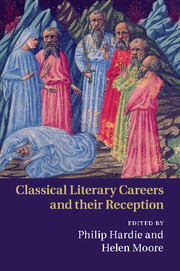Book contents
- Frontmatter
- Contents
- List of contributors
- Preface
- Note on the text
- Introduction: Literary careers – Classical models and their receptions
- 1 Some Virgilian unities
- 2 There and back again: Horace's poetic career
- 3 The Ovidian career model: Ovid, Gallus, Apuleius, Boccaccio
- 4 An elegist's career: from Cynthia to Cornelia
- 5 Persona and satiric career in Juvenal
- 6 The indistinct literary careers of Cicero and Pliny the Younger
- 7 Re-inventing Virgil's Wheel: the poet and his work from Dante to Petrarch
- 8 Did Shakespeare have a literary career?
- 9 New spins on old rotas: Virgil, Ovid, Milton
- 10 Bookburning and the poetic deathbed: the legacy of Virgil
- 11 Literary afterlives: metempsychosis from Ennius to Jorge Luis Borges
- 12 ‘Mirrored doubles’: Andrew Marvell, the remaking of poetry and the poet's career
- 13 Dryden and the complete career
- 14 Goethe's elegiac sabbatical
- 15 Wordsworth's career prospects: ‘peculiar language’ and public epigraphs
- Epilogue: Inventing a life – a personal view of literary careers
- List of works cited
- Index
15 - Wordsworth's career prospects: ‘peculiar language’ and public epigraphs
Published online by Cambridge University Press: 10 November 2010
- Frontmatter
- Contents
- List of contributors
- Preface
- Note on the text
- Introduction: Literary careers – Classical models and their receptions
- 1 Some Virgilian unities
- 2 There and back again: Horace's poetic career
- 3 The Ovidian career model: Ovid, Gallus, Apuleius, Boccaccio
- 4 An elegist's career: from Cynthia to Cornelia
- 5 Persona and satiric career in Juvenal
- 6 The indistinct literary careers of Cicero and Pliny the Younger
- 7 Re-inventing Virgil's Wheel: the poet and his work from Dante to Petrarch
- 8 Did Shakespeare have a literary career?
- 9 New spins on old rotas: Virgil, Ovid, Milton
- 10 Bookburning and the poetic deathbed: the legacy of Virgil
- 11 Literary afterlives: metempsychosis from Ennius to Jorge Luis Borges
- 12 ‘Mirrored doubles’: Andrew Marvell, the remaking of poetry and the poet's career
- 13 Dryden and the complete career
- 14 Goethe's elegiac sabbatical
- 15 Wordsworth's career prospects: ‘peculiar language’ and public epigraphs
- Epilogue: Inventing a life – a personal view of literary careers
- List of works cited
- Index
Summary
Coleridge to Southey, July 1803, discussing plans for a ‘Bibliotheca Britannica’, to include ‘all great names as have either formed epochs in our taste, or such, at least, as are representative; and the great object to be in each instance to determine, first, the true merits and demerits of the books; secondly, what of these belong to the age – what to the author quasi peculium.’
‘The modern “epic”’, Lawrence Lipking has observed, ‘is dominated by one story and one story only: the life of the poet.’ The Prelude; or, Growth of a Poet's Mind is the classic example. But if Wordsworth's is the model of a modern ‘literary career’, it is so because of its insufficiency as a model, its incapacity to offer anything so generic. For one thing, The Prelude addresses itself not to the poet's life but to his Mind and, even if that mind's making is revealed through life events, its material is something altogether more elusive than is the stuff of autobiography. For another, the subtitle, Growth of a Poet's Mind, conveys, in that small detail of the indefinite article, a gesture of humility that demonstrates complete specialness: ‘a’ Poet, this Poet, can never be ‘the’ Poet whose attributes are common to poets in general, or whose skills aim to be transferable to others. Of the closing lines of ‘There was a Boy’ Coleridge memorably remarked that, ‘had I met these lines running wild in the deserts of Arabia, I should have instantly screamed out “Wordsworth!”.
- Type
- Chapter
- Information
- Classical Literary Careers and their Reception , pp. 275 - 286Publisher: Cambridge University PressPrint publication year: 2010



